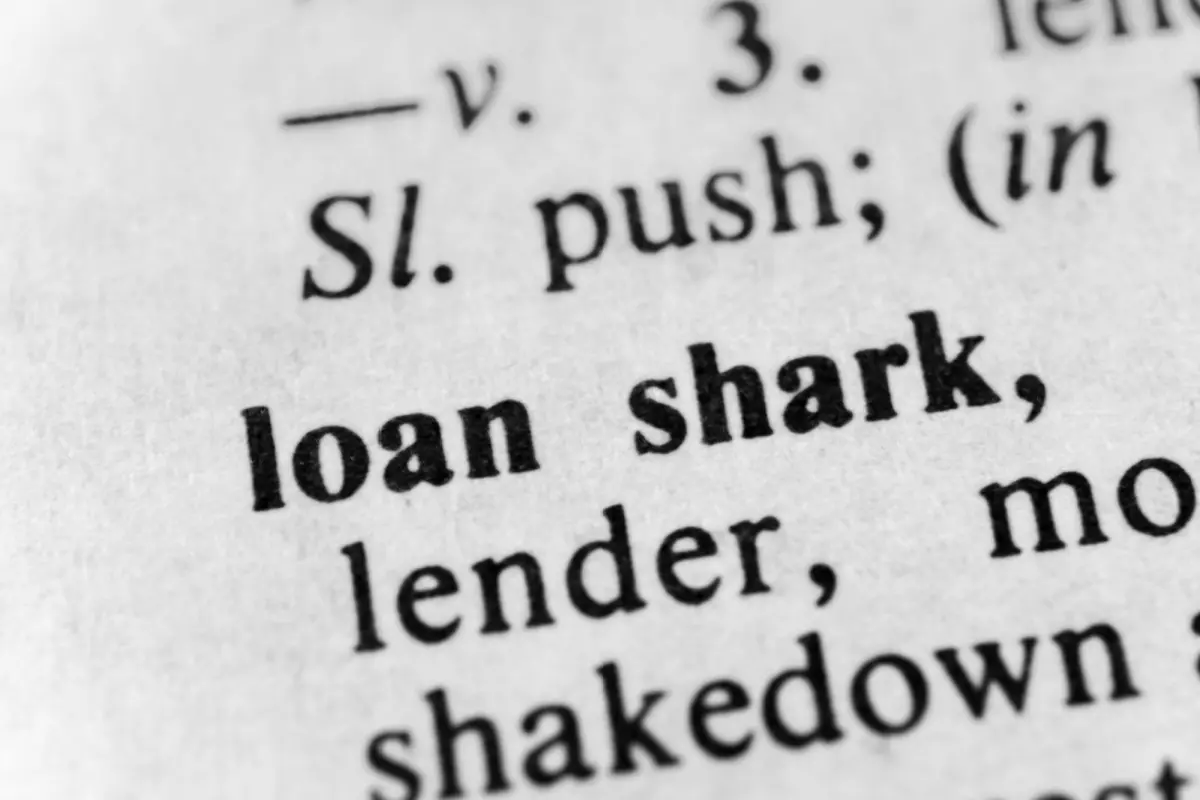When you need quick cash, you may be enticed by lenders offering no credit check or same-day funding options. However, beneath these too-good-to-be-true offers looms the threat of loan sharks. These unregulated lenders offer quick cash but at a steep price: sky-high interest rates and, often, a trail of intimidation.
Understanding who loan sharks are, how loan shark companies operate, and how to steer clear of them is necessary for your financial health. This guide isn’t just about spotting and dodging these risky lenders. It’s also about making smarter, safer financial choices.
What is a Loan Shark?
In the UK, a loan shark is an unregulated lender who often targets vulnerable individuals who need financial assistance during emergencies. Unlike legitimate lenders that are authorised and regulated by the Financial Conduct Authority (FCA), loan sharks operate outside these legal frameworks.

They offer loans with exorbitantly high interest rates and fees and little to no documentation or information about the loan terms. Their practices are not only illegal but can also be deeply exploitative, leading borrowers into a cycle of debt that is difficult to escape. Loan sharks may use intimidation, threats, or violence to enforce repayment, adding a layer of fear and stress for those who borrow from them to cover unexpected expenses.
How Loan Sharks Operate
Loan sharks typically prey on the most vulnerable in society – individuals who often cannot access conventional financial services or are in dire financial situations.
First, loan sharks often start with what appears to be a helping hand – a quick, no-questions-asked loan to those in urgent need of cash. Loan sharks will often advertise no credit check loans or very appealing terms.
Without any paperwork or formal agreement, this informality might seem appealing at first, but it is precisely what leads to their exploitative behaviour. The absence of documented terms means interest rates and repayment schedules can be arbitrarily changed, trapping borrowers in a cycle of debt that becomes increasingly difficult to break free from.
Moreover, loan sharks employ intimidation and fear as tools for ensuring repayment. This can escalate from persistent harassment to threats of violence or actual physical harm, not just to the borrower but potentially to their family and friends as well. Such tactics create an environment of fear, making victims reluctant to seek help or report their lender to authorities.
Loan sharks also often manipulate their victims into believing they have no other option or legal recourse. Victims may be even more hesitant to seek help or report the loan shark because they may feel liable for the loan shark’s illegal practices. Even though victims cannot be held liable, loan sharks often exploit their lack of financial literacy about illegal lending to make them feel like they could be legally responsible.
How to Check if a Lender is Authorised
Before working with a lender, always check if they are authorised by the FCA. They keep an updated register of all authorised financial firms. Here’s how you can do it:
- Financial Conduct Authority (FCA) Register: First, check the FCA’s online register. This database includes all financial firms and individuals authorised by the FCA to offer, promote, or sell financial services or products in the UK. You can access it by visiting the FCA’s official website and using the search function to find a lender by name, firm reference number, or postcode.
- FCA Authorisation: Look for the specific mention of FCA authorisation on the lender’s website or in their correspondence. Legitimate lenders are required to display their FCA registration number prominently. However, don’t take this at face value alone; cross-reference this number with the FCA register to ensure it’s valid and active.
- Contact Details and Transparency: Authorised lenders will have clear contact details, including a physical address and customer service phone numbers. Their websites should provide easy access to clear information about their loans, including interest rates, fees, and terms and conditions. Any ambiguity or reluctance to provide detailed information is a red flag.
- Secure Websites: Look for a URL that begins with “https” and a padlock symbol in the address bar, indicating that the site is secure and that your personal and financial information is encrypted.
- Professional Communications: Authorised lenders maintain a high standard of professionalism in all communications, including advertising, emails, and paperwork. Spelling errors, poor grammar, and unprofessional appearance in loan documents indicate a lack of legitimacy.
- Advisory Services: Organisations like the Money Advice Service offer free, impartial advice on choosing financial products and providers. They can also guide you in verifying a lender’s credentials.
Reasons to Avoid Loan Sharks
Dealing with loan sharks in the UK can trap you in financial quicksand, making it tough to secure your future.

Here’s why it’s wise to keep your distance from these unregulated lenders:
- Exorbitant Interest Rates: According to the Financial Conduct Authority (FCA), regulated lenders have a 0.8% cap on the daily interest rate. This means they cannot charge more than 0.8% interest on the loan per day. Since loan sharks aren’t licensed by the FCA, they don’t abide by interest rate caps. They often charge rates that equate to an annual percentage rate (APR) of 1,500% or even more.
- Unclear Agreements: Most loan sharks don’t provide any official paperwork or a clear contract. This lack of formal documentation means you’re at the mercy of the lender’s terms, which can change without notice. Without clear, agreed-upon terms, you might find yourself owing more money or facing harsher repayment conditions than you initially thought. Unlike these practices, regulated agreements under the Consumer Credit Act 1974 require detailed documentation, ensuring borrowers are informed about repayment methods, non-payment consequences, interest amounts, and any needed security.
- Threats and Intimidation: Loan sharks may use fear to ensure you repay your debt. This can range from persistent harassment to outright threats against you or your loved ones. In stark contrast, the FCA’s rules strictly prohibit lenders from using intimidation, threats, or harassment in debt recovery efforts.
- Risky Collateral Requirements: Loan sharks often ask for personal items or collateral, like passports, to secure loans. This practice risks losing valuable personal assets if you can’t repay them. While FCA-authorised lenders may require collateral for certain loans, it will likely extend to vehicles or homes and never personal items like passports.
How to Spot a Loan Shark in the UK
Spotting a loan shark in the UK is about being alert to the warning signs. Here’s what to watch out for:
- Lack of Transparency: Genuine lenders always provide complete documentation, including all terms and conditions. A lack of clear paperwork should raise concerns.
- Rush Decisions: Credible lenders allow you the time to consider your options without pressuring you for an immediate decision, even in urgent situations.
- Collateral Requirements: Legitimate lenders will never require personal items like passports or bank cards as collateral. Such demands are clear warning signs.
- Costs Aren’t Disclosed: Trustworthy lenders disclose all costs upfront, including interest rates and total repayment amounts. Ambiguity in these areas suggests possible deceit.
- No Credit Checks: Reliable lenders will most likely check your credit history to determine your loan eligibility. A lender that skips this step may not be reputable.
- No Professionalism: Authentic lenders operate with a high level of professionalism, evidenced by a physical office, responsive customer service, and formal communication channels.
- Harassment and Intimidation: Authorised lenders follow the FCA’s standards when attempting to get overdue payments. They don’t resort to intimidation, harassment, or threats.
What to Do if You Owe Money to a Loan Shark
If you’ve encountered a loan shark, take immediate action to mitigate financial and credit damage. Here’s a step-by-step guide on how to handle the situation:
- Seek Immediate Help if Threatened: If you or someone you know is in immediate danger, do not hesitate to call the police. The safety of you and your family comes first, and the police can provide the necessary protection and advice on how to proceed securely.
- Report the Loan Shark: Start by reporting the loan shark to your regional investigative organisation:
- England: Contact the Illegal Money Lending Team (IMLT) at 0300 555 2222, visit the Stop Loan Sharks website, or email reportaloanshark@stoploansharks.gov.uk for confidential support and to initiate investigations.
- Scotland: Report to the Scottish Illegal Money Lending Unit (SIMLU) via 0800 074 0878 or reportaloanshark@scotland.gsi.gov.uk. They collaborate with Trading Standards Scotland against loan sharks.
- Northern Ireland: Direct reports to Trading Standards Consumerline at 0300 123 6262 or through their online form.
- Wales: The Wales Illegal Money Lending Unit (WIMLU) takes reports at 0300 123 3311 or imlu@cardiff.gov.uk.
- Submit Information: When reporting a loan shark, provide as much information as possible, such as the lender’s name, address, and details about the loans given. However, remember that your safety comes first, and you do not need to approach the loan shark to gather this information if you don’t already have it.
- Document Everything: Keep a record of all transactions, communications, and encounters with the loan shark. This includes saving text messages and emails and noting any verbal agreements or threats. Such documentation could serve as significant proof if legal measures against the loan shark become necessary.
- Do Not Pay More Money: Do not attempt to settle your debts by paying more money to the loan shark. This can often lead to a cycle of borrowing that becomes increasingly difficult to break. The authorities can advise you on the steps to take and how to manage your financial situation without further endangering your safety or financial health.
- Legal Advice: Consider seeking legal advice through Citizens Advice and community legal clinics, which offer free legal guidance. They can help you understand your rights and the best course of action in your particular situation.
- Financial Counselling: Contact a financial counselling service for advice on managing debt and organising your finances. Organisations like StepChange Debt Charity provide free debt advice and management plans tailored to your situation, helping you regain control of your financial situation in a structured, manageable way.
- Plan Your Financial Recovery: Once you’ve taken steps to address the immediate threat of the loan shark, begin planning your financial recovery. This might involve setting up a budget, prioritising debts, and exploring legitimate avenues for financial assistance or loans from reputable lenders.
Remember, the agencies handling these reports understand the risks and fears associated with coming forward. As a result, they allow and encourage anonymous reporting.
Consider Authorised Lenders
Authorised lenders offer a legitimate and regulated alternative, ensuring your borrowing experience is safe and transparent.

If you need financing, you can explore your options from:
- Credit Unions: Credit unions are not-for-profit organisations that offer loans to their members. Interest rates are capped by law, making loans from credit unions more affordable than many other lenders. Membership is typically based on a common bond, such as living in a particular area, working for a specific employer, or being a member of a certain group or association.
- Banks: Traditional banks offer a range of financial products, including personal loans. These institutions are regulated by the Financial Conduct Authority (FCA) and the Prudential Regulation Authority (PRA), ensuring they adhere to strict lending criteria and conduct rules.
- Community Development Finance Institutions (CDFIs): CDFIs are social enterprises that provide financial services to underserved markets and populations within the UK. They offer loans to individuals who may not qualify for traditional bank loans, including personal loans with more flexible criteria than mainstream banks.
- Direct Online Lenders: For added convenience, you can also request payday loans from FCA-authorised online lenders. Quidable works to connect borrowers with credible sources for your financial needs. Acting as a broker, Quidable helps connect you with an extensive network of reputable and FCA-authorised lenders, simplifying the process of finding a reliable online payday loan option.
Before agreeing to any loan, ensure you fully understand the terms and conditions, including the interest rate, repayment period, and any fees or charges associated with the loan. Legitimate lenders will provide clear, upfront information about their loans, allowing you to make an informed decision.
Summary
In the world of lending, being aware and informed is your best protection, especially when it comes to loan sharks in the UK. Knowing how loan sharks operate, the signs to watch out for, and the steps to take if you encounter one empowers you to steer clear of their traps.
For your financial needs, lean on services like Quidable and its partnerships with direct lenders. Quidable helps connect you with a network of trusted, licensed lenders. This way, you can explore your financing options with peace of mind, knowing you’re making smart, safe financial decisions.